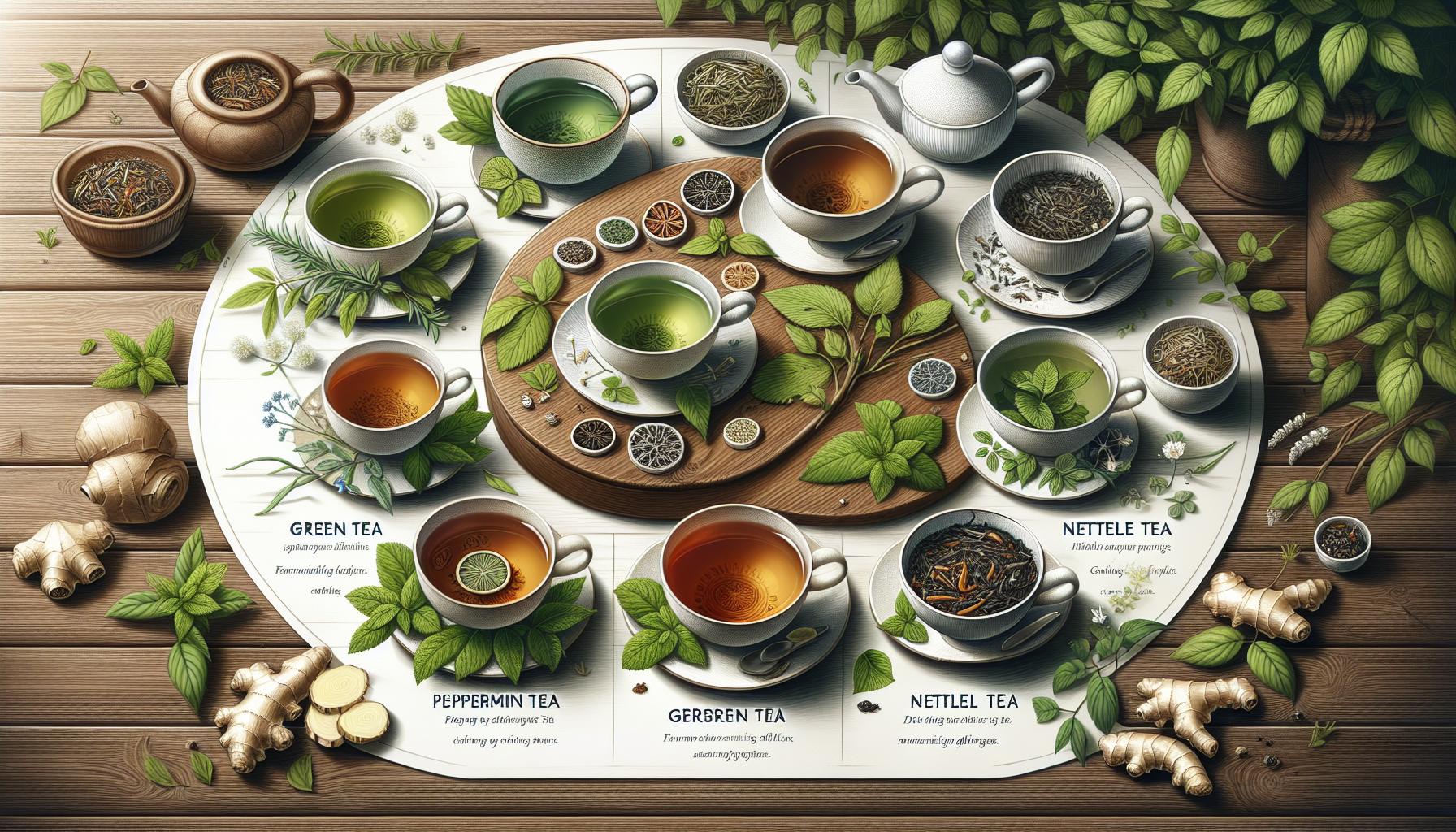Spring’s in the air, but for many of us, that means sneezing, itchy eyes, and a runny nose. Allergies can turn a beautiful day into a miserable one. While there are plenty of over-the-counter medications available, sometimes the best remedies come from nature itself. That’s where tea steps in.
I’ve found that certain teas can offer surprising relief from allergy symptoms. Whether it’s reducing inflammation or soothing irritated throats, these natural brews can be a game-changer. Let’s dive into which teas are most effective for tackling those pesky allergies and why they work.
Understanding Allergies and How Tea Can Help
Allergies manifest as the immune system’s response to foreign substances. Seasonal allergies often trigger symptoms like sneezing, itchy eyes, and a runny nose. Teas contain natural compounds that can alleviate these symptoms, making them effective against allergies.
Types of Allergies
Different allergies affect people in various ways. Common types include hay fever (pollen allergy), food allergies (nuts, dairy), and pet allergies (dander). Seasonal allergies usually arise from pollen in the air, while environmental allergies can stem from dust or mold. Each type can disrupt daily life, causing discomfort and irritation.
The Role of Natural Remedies
Natural remedies, such as drinking certain teas, play a significant role in managing allergy symptoms. Teas like peppermint, butterbur, and rooibos possess anti-inflammatory properties that help reduce swelling and irritation. Herbal teas can act as antihistamines, soothing the body’s immune response. By incorporating these teas into a daily routine, individuals can find relief without relying solely on medications.
Best Teas for Allergy Relief

Green Tea
Green tea contains a high concentration of catechins. These antioxidants can help reduce inflammation and improve overall immune response. Studies, like one from the Journal of Nutritional Biochemistry, demonstrate that catechins can inhibit histamine release, making green tea effective against allergy symptoms. Drinking two to three cups daily may provide noticeable relief.
Peppermint Tea
Peppermint tea is rich in menthol and serves as a natural decongestant. This tea can alleviate nasal congestion and soothe irritated mucous membranes. Research published in the Journal of Ethnopharmacology supports the tea’s anti-inflammatory and antimicrobial properties. A couple of cups a day can help clear sinuses and improve breathing.
Ginger Tea
Ginger tea boasts strong anti-inflammatory and antioxidant properties. It contains gingerol, which has been shown to inhibit the production of pro-inflammatory cytokines, according to the International Journal of Preventive Medicine. Drinking ginger tea can ease throat irritation and reduce allergy-induced inflammation. Consuming two cups daily is advisable for optimal benefits.
Nettle Tea
Nettle tea acts as a natural antihistamine. It can reduce inflammation and manage symptoms like itching and sneezing. Clinical studies, particularly one from the University of Maryland Medical Center, indicate that nettle tea can effectively mitigate allergy symptoms. Drinking one to two cups daily is recommended for best results.
Rooibos Tea
Rooibos tea contains bioflavonoids such as quercetin. These compounds can block the release of histamines, helping to reduce allergy symptoms. Research highlighted in the Phytomedicine Journal shows rooibos tea’s potential to alleviate allergies without causing drowsiness. Consuming two to three cups daily can help maintain symptom relief.
How to Use Tea Effectively for Allergies

Brewing Techniques
Proper brewing techniques maximize tea’s benefits. Start by using filtered water, as impurities can affect tea’s effectiveness. Heat the water to the recommended temperature:
- Green Tea: 160-180°F (71-82°C)
- Peppermint Tea: 212°F (100°C)
- Ginger Tea: 212°F (100°C)
- Nettle Tea: 205-212°F (96-100°C)
- Rooibos Tea: 212°F (100°C)
Steep the tea for the correct duration:
- Green Tea: 1-2 minutes
- Peppermint Tea: 5-7 minutes
- Ginger Tea: 10-15 minutes
- Nettle Tea: 10-15 minutes
- Rooibos Tea: 5-7 minutes
Use fresh leaves or high-quality tea bags to preserve potency.
Best Times to Drink Allergy-Relief Teas
Timing impacts tea’s efficacy:
- Morning: Drink green tea or peppermint tea to start the day with a boost in antioxidants and clear nasal passages.
- Afternoon: Opt for ginger tea or nettle tea to maintain anti-inflammatory effects as pollen counts rise.
- Evening: Consume rooibos tea for its calming effects and to reduce nighttime allergy symptoms.
Ensure consistent intake by drinking at least 2-3 cups per day.
Complementary Allergy Management Practices
Combine tea with other practices for optimal results:
- Healthy Diet: Incorporate anti-inflammatory foods like fruits, vegetables, and omega-3 fatty acids.
- Hydration: Drink plenty of water to keep mucous membranes moist and flush out allergens.
- Quercetin Supplements: Enhance the effects of tea, as quercetin stabilizes mast cells, reducing histamine release.
- Clean Environment: Regularly clean your living space to minimize allergen exposure.
- Steam Inhalation: Use steam inhalers with essential oils like eucalyptus or peppermint to complement the effects of tea.
These additional practices improve overall allergy management.
Potential Side Effects and Considerations

Allergic Reactions to Teas
Some individuals may experience allergic reactions to certain teas. Those allergic to plants like chamomile or ragweed might also react to teas made from these plants. Common reactions include skin rashes, itching, or digestive issues. If someone shows signs of an allergic reaction after consuming tea, it’s best to stop drinking it and seek medical advice.
Interaction with Medications
Teas can interact with specific medications. For example, green tea might affect blood thinners due to its vitamin K content. Additionally, certain teas like ginseng tea may raise blood pressure, affecting those on medication for hypertension. It’s essential to consult with a healthcare professional before adding new tea to a daily routine, especially for individuals on prescription medications.
Conclusion
Exploring natural remedies like tea can be a game-changer for managing allergy symptoms. While teas such as green tea, peppermint tea, ginger tea, nettle tea, and rooibos tea offer significant benefits, it’s crucial to be mindful of potential side effects and interactions with medications. Complementary practices like maintaining a healthy diet and staying hydrated can further enhance your allergy relief strategy. Always consult with healthcare professionals before introducing new teas into your routine, especially if you’re on prescription medications. This balanced approach ensures you get the most out of your tea consumption while staying safe and healthy.
Frequently Asked Questions
What types of teas can help alleviate allergy symptoms?
Teas like green tea, peppermint tea, ginger tea, nettle tea, and rooibos tea can help alleviate allergy symptoms due to their antioxidant content and ability to inhibit histamine release.
How should I brew allergy-relief teas for maximum benefits?
For maximum benefits, steep allergy-relief teas in hot water (not boiling) for about 5-10 minutes. This helps extract the beneficial compounds without degrading them.
When is the best time to drink teas for allergy relief?
The best times to drink allergy-relief teas are in the morning and evening. Drinking tea in the morning can start your day with a defense against allergens, while evening tea can help reduce nighttime symptoms.
Are there additional practices to optimize allergy relief besides drinking tea?
Yes, maintaining a healthy diet, staying hydrated, taking quercetin supplements, ensuring a clean environment, and using steam inhalation can help optimize allergy relief alongside drinking tea.
Can teas interact with medications?
Yes, certain teas can interact with medications. For example, green tea affects blood thinners due to its vitamin K content, and ginseng tea can raise blood pressure. Consult a healthcare professional before adding new teas to your routine.
What potential side effects should I consider when consuming teas for allergies?
Potential side effects include allergic reactions to specific teas, especially for individuals with plant allergies like chamomile or ragweed. Always start with small amounts and consult a healthcare professional.
Why is it important to consult a healthcare professional before drinking specific teas?
Consulting a healthcare professional is crucial to ensure that the teas do not interact negatively with your existing medications or health conditions, ensuring safe and effective allergy management.